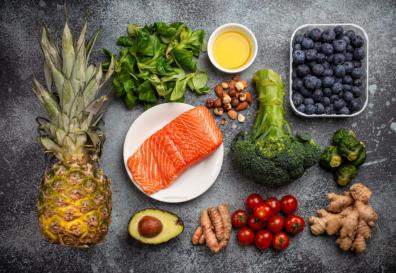Anti-Inflammatory Foods and Tips
Inflammation is a buzzword lately, with tons of people discussing its causes, its negative impact on the body, as well as sharing advice on how to lower your levels. With all these voices, it can be difficult to get concise, clear information about inflammation and how to protect yourself from its effects.
Why is learning about inflammation important?
Unfortunately, chronic inflammation affects huge percentages of the population and manifests as many different chronic conditions, such as:
Heart disease,
Arthritis,
Diabetes,
Hypertension,
Irritable bowel syndrome
And more!
Inflammation isn’t necessarily bad though. When you’re hurt, your body’s immune system response sends white blood cells rushing to the site and you see redness, swelling and may feel heat at the site of the wound. This is inflammation and in a healthy body is a necessary step towards healing.
The problem comes into play when our lifestyles and diets contribute to CHRONIC inflammation, meaning the inflammatory cells are being sent when there is no outside danger the body needs to deal with. For instance, in the case of rheumatoid arthritis, inflammatory cells attack the body’s joint tissues.
Inflammation can also be caused by physical, emotional and mental stressors, environmental toxins, and foods we eat such as wheat, cow’s milk and alcohol.
The good news is there are lots of anti-inflammatory foods and practices that support your body in lowering inflammation levels. Below are some of the major practices and foods that are key to an anti-inflammatory diet and lifestyle.

Carrying extra body fat, especially around the belly, can cause increases in overall chronic inflammation, as well as inflammatory markers such as CRP (C-reactive protein). Try walking or moving your body in a joyful way each day and see if you can get structured movement for 10 minutes a day, and 30 minutes 3 times a week. Additionally, having dinner a bit earlier (before or around 6pm if possible) and giving yourself 12 hours between dinner and breakfast the next day can help immensely with weight management and insulin resistance.
Hundreds, possibly thousands, of articles have been written about the Mediterranean diet and its effects on inflammation based on studies and empirical research. Lowering inflammation begins with a diet rich in a variety of vegetables, nuts, seeds, and wild caught fish high in omega-3 fatty acids and minimal amounts of red meat, processed foods and sweets. Olive oil also can help increase omega-3 content without adding omega 6 fatty acids. While this list highlights foods with incredible anti-inflammatory effects within the body, it is not any one food in particular that will help you fight chronic inflammation, but the marriage of a plant-based diet, healthy fats and high quality protein.
Green leafy vegetables are rich in antioxidants that protect and restore cellular health as well as boast high levels of important vitamins such as B, C, A and K. Vitamin K can actually help protect your brain from oxidative stress caused by free radical damage (associated with chronic inflammation). Swiss chard, kale and bok choy are among the most therapeutic leafy greens to eat. If you struggle with adding greens to your diet, consider adding them to smoothies with bananas and berries or juicing them. I love sauteed swiss chard with olive oil, salt, garlic and finished with some lemon juice – yum! Some recent studies show that bok choy has 70 robust antioxidant substances that scavenge free radicals (wow!).

Not only is broccoli an antioxidant powerhouse that can combat chronic inflammation, but it can protect against developing cancer as well. Broccoli and other cruciferous vegetables (such as cauliflower, brussel sprouts, and cabbage) contain potassium and magnesium which can work together with antioxidants to lower oxidative stress in the body.
Many studies have been done touting the anti-inflammatory benefits of celery. Celery seeds can also help to fight bacterial infections in addition to its antioxidant properties. Celery is also high in potassium, which helps to flush toxins from the body.
Deeply colored foods generally contain the highest levels of antioxidants and beets might top the charts for deep coloring! Beets also contain a good amount of magnesium (low magnesium levels have been linked to chronic inflammation).
Quercetin is an antioxidant that is found in dark colored berries, as well as citrus and olive oil, that can help combat inflammation and cancer, as well as having antiviral properties. Quercetin and bromelain (an enzyme found in pineapple) are often used together to support the actions of each other as they have a synergistic relationship. Studies have also shown blueberries to be protective against cognitive function and some researchers state this is due to the antioxidant properties that protect the brain against oxidative stress. Bromelain can also help to modulate the immune system, helping to regulate the immune response that causes unnecessary inflammation.
Wild-caught salmon is one of the richest sources of omega-3 fatty acids in our diet. Omega 3s are imperative for cognitive function (such as memory) and deficiency has been linked to chronic inflammation and could be linked to anxiety and depression. Other fish high in omega 3s are mackerel, anchovies, and sardines. Supporting your omega 3 levels is one of the best things you can do to improve inflammation symptoms in the body. Some non-fish sources of omega 3s include: seaweed, flax seeds, chia seeds, walnuts, flax or walnut oil, olives and extra virgin olive oil.
Curcumin, an active anti-inflammatory compound in turmeric, has been shown in several studies to work even better than aspirin or ibuprofen against inflammation. Ginger is another immune modulator that has been shown to reduce inflammation caused by overactive immune responses. In Ayurvedic medicine, it is touted as a wonderful herb to cleanse the lymphatic system (which is basically our body’s sewage system that pulls toxins out of the cells and aids in elimination of toxins).
Chia and flax seeds are excellent sources of omega 3 fatty acids, minerals and vitamins that support anti-inflammatory processes. Chia seeds’ ability to reverse inflammation, regulate cholesterol and lower blood pressure make it extremely beneficial to consume for heart health. Lignans, found in flax seeds, are unique fiber-related polyphenols that provide us with antioxidant benefits for anti-aging, hormone balance and cellular health.
Bone broth offers calcium, magnesium, sulfur, phosphorus and other minerals that your body can easily absorb. The collagen in bone broth is healing to and protective of the damaged gut lining in an inflamed gut. Bone broth also contains compounds such as glucosamine and chondroitin sulfates which have long been shown to combat inflammation and support joint health.
Cellular, animal and human studies have shown the anti-inflammatory effects of drinking green tea. Further, green tea and it’s component, EGCG, suppress the expression of inflammatory cytokines and inflammation-related enzymes. If you’re sensitive to caffeine, consider drinking decaf green tea before noon.
Sugar and industrial seed oils found in most processed foods are the major culprits contributing to chronic inflammation and the disease states inflammation can bring. It’s important to avoid soda, packaged baked goods such as cookies, cakes (think Little Debbie), fried foods, and other foods which contain added sugars and seed oils.
Sugar’s relationship with inflammation is well known. When sugar is processed in the body, it triggers the release of pro-inflammatory compounds, causing inflammation responses that negatively impact joint health, cognitive function, gut health and promotes obesity, diabetes, tooth decay and other health problems. Some studies have suggested fructose is especially inflammatory in the body. Fructose is found in soda, store-bought fruit juice, cakes/pies/cookies, ice cream, fast food, cereal, jelly, canned and dried fruit, salad dressings, granola and is even prevalent in some natural sweeteners like agave syrup.
Industrial seed oils not only promote inflammatory responses in the body, but they negatively affect a person’s omega 3:6 ratio, which causes inflammation as well. Oils to watch out for in your food and drinks include: safflower, sunflower, corn, soy, peanut, canola, ricebran, grapeseed, and cottonseed oils.
Omitting, or even limiting, products with refined sugar and industrial seed oils will go a long way in supporting your overall health.
Wellness Coach

